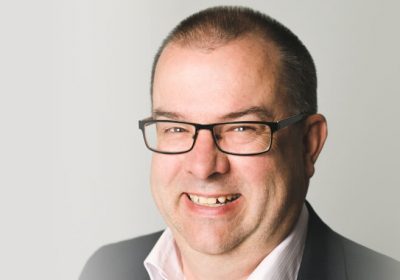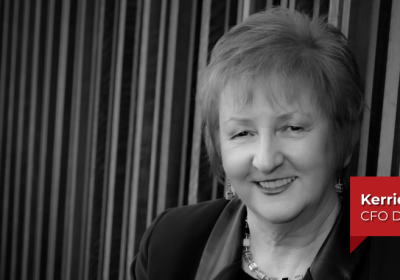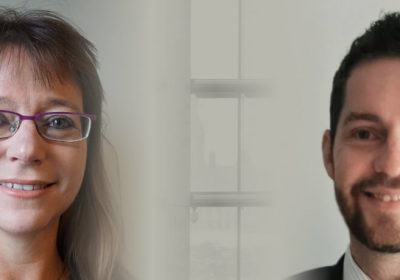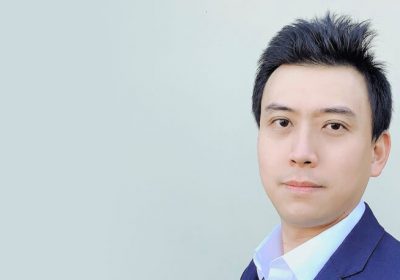
- Author: Jay Orsborn
- Posted: March 1, 2020
Open to Change
Anthony Elliott is an enterprise leader with a goal of aligning effort to impact
Anthony Elliott is the Chief Operating Office of the online digital platform, Open Universities Australia (“OUA”) and his wide-ranging remit includes Finance, Data & Analytics, Legal, HR, IT, Coaching & Continuous Improvement and Partnerships.
The business does not have a formal CFO but with genuine humility, Anthony notes that this is simply one of the many roles he plays and he believes that his detailed knowledge of operations gives him more credibility when presenting numbers in the boardroom.
“I don’t think of myself as a role or a title. I have a set of experiences that can be applied to organisations that need them and see myself as an enterprise leader with the goal of aligning effort to impact.”
When referring to his wide remit, Anthony says he empowers his leaders to make decisions in their areas and he focuses on getting them to think about how they add value to the other areas of the business.
He is constantly asking them, “What do you see and think because of information you have access to that others do not.”
In a world where the CFO is expected to contribute to strategy and play a lead role in driving performance, Anthony has a lot of valuable insight for the strategic CFO.
Resetting OUA’s strategic direction
OUA has a successful, 27-year history and like many not for profit organisations, it has a very clear purpose but it has also been through significant changes over the last 5-10 years.
“Our purpose is to enable access to Higher Education by providing different pathways, it is written into legislation and the way we achieve this has evolved over time.”
Anthony recalls when he first arrived at OUA and there were conversations with shareholders about whether the business should continue to exist.
Some might be daunted by this conversation but he saw it as a great opportunity, “organisations should constantly be asking why they exist and what value they add”.
Following on from the conversations with shareholders, OUA pivoted from a strategy of expansion into new areas (launching an online vocational training business, providing white label services and shaping the online experience) to becoming a marketplace that helped students navigate the (sometimes confusing) world of higher education.
Clear and compelling narrative is critical
As they worked through the new strategy, Anthony’s instinctive focus on narrative kicked in and he kept asking ”how does this new approach fit with students, shareholders, employees and partners – does all of that hang together? If I was telling this story, what questions would people ask? Are there inconsistencies? Are all disparate areas working towards something that is common?”
Once the strategy and story were set and understood, it was all about making it happen and Anthony employed an unconventional but effective technique to get his message across.
“I wanted everyone to focus on and understand our student acquisition funnel, so I put a picture of the funnel on a t-shirt and wore that to meetings until everyone understood.”
The message really hit home.
Anthony wore the t-shirt for a year and he enthusiastically notes the power of repetition.
His unconventional approach also inspired others in the business and the t-shirt he wore hangs in the OUA kitchen along with others that were created by his peers.
A brutal lens on focus
Key to delivering the new strategy was what Anthony refers to as a “brutal lens on focus – decide what you are going to do and more importantly, decide what you are not going to do.”
Anthony notes that a conscious decision to be something is not enough to make it happen and that it is critical to ask “what are we shutting down? What are we not going to do?” and then make sure you exit that well.
The power of admitting you don’t know
Anthony is passionate about the power of admitting you don’t have the answer and the danger of basing decisions on opinions and guesses. His mantra is to make the best decisions you can with the information you have available, learn from every decision and evolve your thinking from there.
“Having the discipline to keep asking whether we keep going or stop and take a new direction is critical and how we should run the business from top to bottom.”
Anthony also explains a concept he borrowed from a peer of FOG (this is the only acronym he uses) or Facts, Opinions and Guesses. “Everything people say falls into one of these categories” and Anthony says that it is essential to base decisions on facts and be very honest when sharing opinions and guesses.
“If we start out thinking we already know the answers, we will be closed to possibilities. It is OK not to know. When we admit we don’t know, we see situations as having interesting aspects to explore and we can focus on what is most important to understand.”
Data, Analytics and driving business performance
When I ask about the role of data and analytics, it is clear from Anthony’s reaction that he sees this as a critical area in building a culture of curiosity and driving business performance.
Anthony explains that the Data and Analytics team play a key role in providing facts and highlighting where the business might be basing decisions on opinions and guesses. He uses the analogy of an onion to explain how he sees the role of the Data and Analytics team.
“At the core, the team holds the mental model of the business – how the business works, what flows where, how things connect and what we are trying to do – it is a whole of business perspective. The middle layer is designing the data model that that supports the mental model of the business and working out what do you process in individual systems vs. in the central data store. The outer layer is how you take that information to the business.”
How information is presented to the business is critical and language is really important.
“The team were initially called ‘data and insights’ but the word insights was quickly dropped. I don’t want people to think that insights only come from this team – I don’t want people to think this team have all the answers as this could undermine a culture curiosity.”
Finance as a partner in value
Anthony explains that the finance operations at OUA are not complicated and that tracking spending and cost management is a big part of the team’s focus. The finance team has invested in getting processes and systems optimised to free up time for value-add activity.
“When the finance team have cost management as a focus it is easy to be seen as a gatekeeper, but this misses the opportunity to really add value. Thinking about the organisation from a resource allocation perspective and ensuring this is consistent with the strategy is where the opportunities to add value are.”
Anthony regularly challenges his team to think about different ways to look at the cost structure to better align with strategy and to be curious about the business.
Moving from management to an executive role
Anthony explains that moving into an executive role required a major shift in the way he worked.
“I have never doubted my ability to get things done and there were no barriers that I could not remove through connecting, listening and influencing. The key to an executive role is creating the environment for others to get things done the right way.”
Fitting it all in
Achieving a healthy work life balance is important for Anthony and not surprisingly, he applies the same discipline to self-organisation and his own time as he instils across the organisation.
“The demands on mental energy are greater than physical energy. I set clear personal boundaries for my time and mental preparation and organisation of the day are key.”
Anthony describes a practice that involves, planning the day, reading, journaling and mapping sources of stress vs. levels of activity.
Keeping knowledge current
Anthony’s mantra for his personal development is “I learn every day”
and this has informed the choices he has made through his career.
“After completing a PhD, I was reluctant to take on further study and do an MBA so I actively sought out projects that would give me similar exposure and learning. I set up a business for IPO, worked on post-acquisition integration, market analytics, strategy and pricing/commercials.”
Anthony has recently enrolled in a grad cert finance which he says is a great way to fill out any gaps in his finance knowledge and experience life as an online student.








